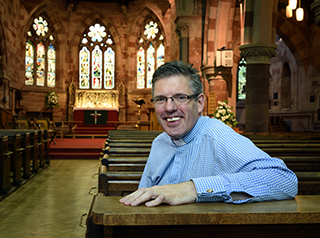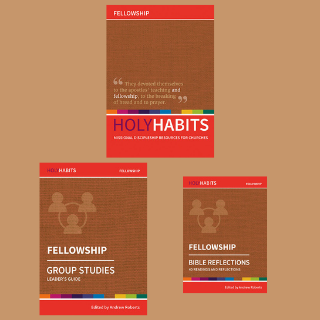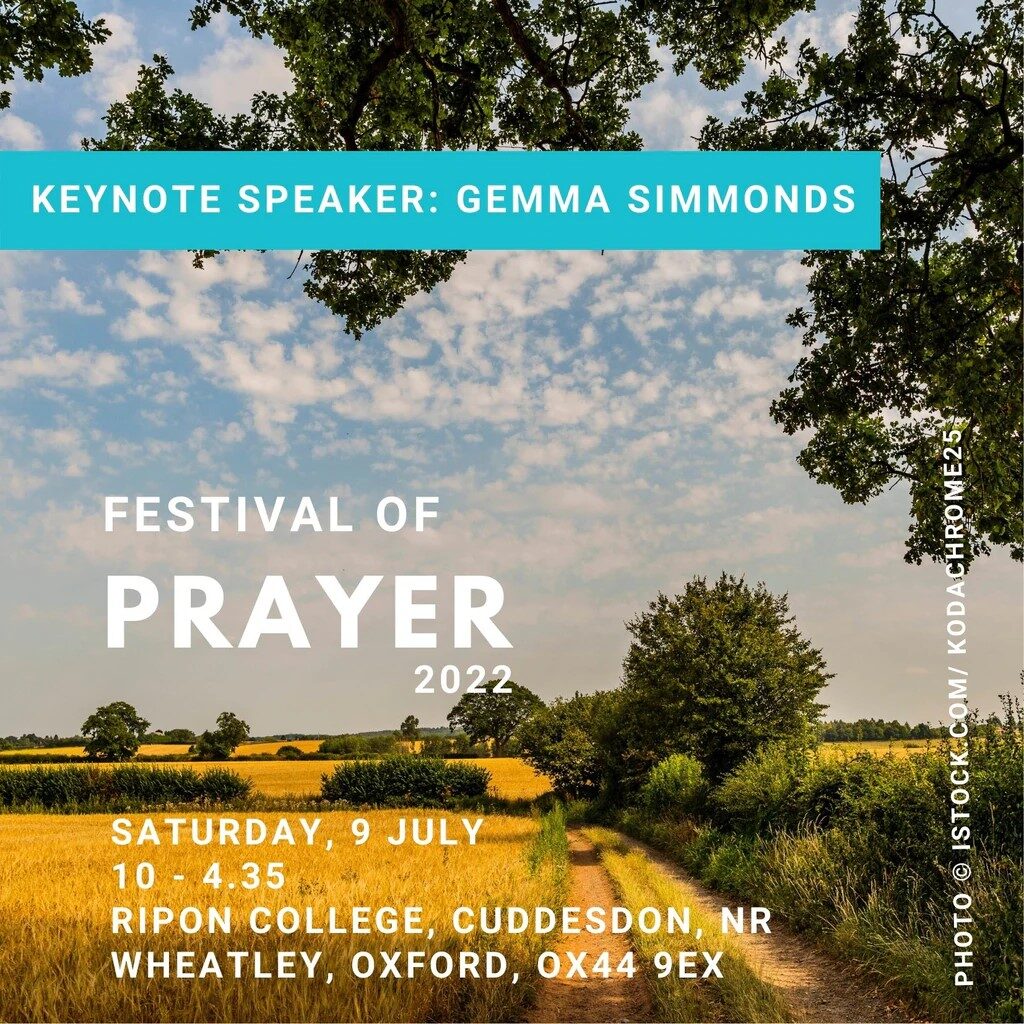In the third of our ‘Growing faith’ articles, Shrewsbury vicar Phil Cansdale shares how he discovered the riches of Holy Habits during lockdown and how his congregation is still using them today as they address the ‘big church questions.’
29 May 2022
A thriving church
‘The one thing people know about Shrewsbury is that it floods,’ says Phil Cansdale, vicar of Trinity Churches and area dean. ‘The river does all the wrong things fairly often and some very good friends lead churches that have been flooded out.’
Phil was brought up in Bristol, where he ‘sort of hung around’ the local BBC radio station, picking up skills which, as we’ll hear, would come into their own during lockdown. He started ordained life in Canterbury and moved with his family to Shrewsbury about 13 years ago. It’s a thriving church community with between 400 and 500 people ‘who belong somewhere to life here’. Phil leads a staff team of a dozen or so, and the church runs a shopping-centre café and a community centre, with 1,000 people coming in each week, ‘at least in the old days,’ he adds, acknowledging the impact of the pandemic.
‘So it was a fairly busy, thriving parish, and then all of a sudden we had to shut our doors. We had to put up closed signs on our church, our conference centre and our café, and I’d never been taught how to do that at vicar school.’
He may not have been taught what to do at theological college, but he and his team were quick to adapt.
‘We had to put up closed signs on our church, our conference centre and our café, and I’d never been taught how to do that at vicar school.’
‘We found ourselves doing lots of different things,’ he says, ‘like networking with the food hub locally, and doing a lot with a nearby housing estate with some really significant needs. One of the things we actually could do was deliver food to 140 homes each week, and just try to be there for people. There’s nothing novel about that – loads of churches did that and did it really, really well.’
Six O’Clock Live
But where Trinity was different was in the speed with which they went online.
‘As a church we had pretty decent gear and quite a few of us who liked playing with toys and gadgets. So probably within three or four days of everything shutting down we turned round and said, “You know, the one thing we probably can do is go online.” A little bit of media savviness from my Radio Bristol days, as well as some skills, gave us the ability to think, How on earth are we going to do life now?’
Which is how, just a week into lockdown, Phil sat down at six o’clock one evening thinking, I’m going to go live on Facebook and just sit there and say, ‘I don’t really know what’s going on. But if anybody is here, why don’t we pray?’
He’s at pains to say he was not an immediate viral sensation: ‘That first night, it was shocking. The quality was utterly dreadful, but I just prayed and read scripture. Facebook Live felt like the right platform to use because people didn’t have to pop up on screen and engage. They could just be there without any pressure. And the next night I thought, Well, why don’t we try it again?’
‘That first night, the quality was utterly dreadful, but I just prayed and read scripture. The next night I thought, Well, why don’t we try it again?’
Six O’Clock Live was born. The format was simple, as Phil explains: ‘I’d say hello. And I’d say, “I don’t know what’s going on. How about you? What are we going to do now?” At that stage, we thought this was going to last for three or four weeks, and the tone was Hang on in there. I’ll see you soon. I would read a Psalm, waffle on for three or four minutes, play a piece of music and say, “See you tomorrow”.’
From that first evening, they met for 15–20 minutes every day, Monday to Friday, and they are still meeting now. At its height, about 60 households joined; today it’s between 15 and 20, with another 10–15 catching up later. ‘So it’s absolutely not viral,’ insists Phil again, ‘but it very clearly met a need for the people involved.’
As it became clear that lockdown was going to go on a lot longer than the few weeks they had first envisaged, Phil began to encourage people to send in reflections, readings, prayers and music suggestions, so over the past 18 months, more and more people have taken part.
Holy Habits
In the past ten months, Holy Habits resources have also featured large in Six O’Clock Live and, as life has opened up again, in the whole range of church activities.
‘I heard via a colleague that a neighbouring church had dipped their toes into Holy Habits,’ says Phil. ‘So over the summer we started looking at the whole suite of resources and just thought there are really good ideas here.’
Last September, they started using Holy Habits both in Sunday services and midweek groups, as well as in Six O’Clock Live.
‘There was a sense of Welcome back! in the Sunday services but also a need to ask really significant questions, like what are we here to be and do as a church?’
They decided to use Holy Habits to help ‘figure out some answers’, and looked at one habit a week for ten weeks across all their different church activities.
‘There was a need to ask really significant questions, like what are we here to be and do as a church?’
‘In the autumn, we did Fellowship’, says Phil, ‘and that felt really timely at that stage when we were beginning to do life a little bit more. It was really kind of total immersion in each habit.’
So how did people respond?
‘The more practically grounded ones – Sharing Resources; Gladness and Generosity – those particularly hit home: they gave people some really practical out-workings. The Breaking Bread one was profoundly moving as well. Alongside preaching and opening up these really pivotal themes in the DNA of the church, we tried really hard each Sunday to say we’re going to do something that lives this out.’
‘One of the things that Holy Habits has taught us,’ says Phil, ‘is that church at its best is Monday to Saturday as well as Sunday. We are absolutely not Holy Habits experts! I feel a bit of a fraud that we’ve just found a resource that works for us. It’s an approach and materials which work, particularly at a time when we’re exploring these DNA questions about what are we here to be and do as a church. I think the Holy Habits suite of resources is brilliant.’

Phil Cansdale is vicar of Meole Brace and area dean of Shrewsbury

Holy Habits is an adventure in Christian discipleship based upon Luke’s picture of the early church in Acts 2:42-47. It explores and encourages the practice of ten disciplines, or holy habits.

Festival of Prayer '22
Prayer and personality
After a two-year absence, the Festival of Prayer returns to the delightful setting of Ripon College in the picturesque Oxfordshire village of Cuddesdon. The festival is an opportunity to invest in your relationship with God, in the company of deeply thoughtful and experienced speakers.
